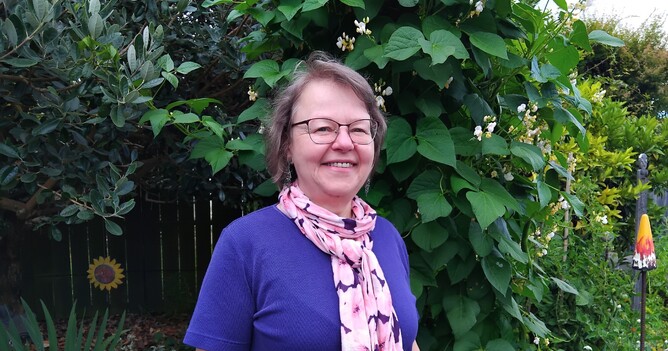What was on the menu?
Gina Salapata was born and bred in Greece, which led her to host a Greek banquet to mark the 50th anniversary of Classical Studies at Te Kunenga ki Pūrehuroa, Massey University. Gina is an Associate Professor of the Classical Studies Programme in the School of Humanities, Media and Creative Communication at Massey University.
The ancient Greek banquet that she hosted was held at Wharerata restaurant at Massey University's Manawatū campus in late 2024. It was attended by over 70 diners, including colleagues, friends, Wharerata regulars and current and former Classics students.
Who prepared the dinner?
I gave this challenge to my Greek friend and talented chef Nikos Moraitis to create a dinner menu using only ingredients found in ancient Greece. With my guidance, he delivered an impressive spread. It was quite a feat considering modern staples like potatoes, rice, pasta, lemons, tomatoes and sugar were not part of ancient Greek food.
I interviewed her online about her culture and the inspiration behind the dinner.
What was on the menu?
Souvlaki, olive tapenade, homemade sourdough, focaccia with olives, rosemary and sea salt flakes with dips of olive oil, vinegar, and oregano; chickpeas with herbs and a walnut garlic spread with herbs.
For the entree we had cured kingfish and tuna with sea salt and honey served with pickled cucumber, fennel salad and radish, drizzled with extra virgin olive oil and herb oil. The vegan option was roasted beetroot and turnip, sliced finely.
Salad was lettuce with hazelnuts, figs and cucumber served with molasses dressing.
The main dishes were roasted pork belly marinated with fennel seeds and cinnamon; slow-roasted lamb leg marinated with rosemary and thyme and oregano; pork sausage with sage. The vegan option was roasted beans with dill, garlic, onions and carrots.
The side dishes were asparagus roasted with pinenuts and olive oil; carrots glazed with honey, thyme and walnuts and another dish of beetroot roasted with garlic, vinegar and herbs.
For dessert we had goat’s cheese covered with pistachio served with figs, raisins, walnuts, hazelnuts, apricots, crackers, toasted chickpeas, and pears. We also had a cheesecake with aromatic cinnamon, lemon zest, honey syrup glaze, and blackberry jelly.
What sparked your interest in ancient Greek culture and studying the Classics?
I’m originally from Greece and was surrounded by antiquities when I grew up. Holidays and family trips often involved visits to archaeological sites. I still remember the thrill of touching ancient stones and pottery shards lying around; the thought that these were crafted by human hands thousands of years ago gave me goosebumps so it’s no wonder that my two job preferences were to be a classics teacher or an archaeologist. I managed to combine the two.
Was there a moment when you wanted to dive into ancient Greek and Roman life?
If I had a time machine, I would choose to travel to ancient times rather than the future; I would have so many questions to ask the people of the past to help complete the puzzle they've left us. While we have a wealth of information about Greek and Roman rulers, generals, philosophers and writers, we know much less about the lives of ordinary people. As a researcher, I focus on material culture, which provides insights into the daily lives, cultural traditions and religious beliefs of everyday people, particularly women, who are underrepresented in historical sources.
Have you tasted many modern Greek wines and if so, what are your favourites?
I’m not much of a wine drinker, but one type of Greek wine I enjoy is the aromatic Moschofilero. I also have fond memories of a special wine I tasted in Santorini back in the early 1980s. I was participating in an excavation at the time and one of the workers brought us some special wine that his family produced. This wine was not for sale; it was reserved solely for the family. I remember it being a delicious dark red of syrupy consistency; a nectar fit for the gods.
What is the biggest take-home message from your Classics studies?
Studying the past helps us make sense of the world today and the challenges we all face.
The ancients encountered problems that are still relevant today, such as issues of gender and ethnic identity, multiculturalism, colonialism and imperialism, political corruption and propaganda. By examining how they responded to these complex challenges, we can find potential solutions to our own issues.
As the emperor Marcus Aurelius, who was a Stoic philosopher, said, “What follows is ever closely linked to what precedes”.
What is the biggest surprise for those new to Classics?
My students find it surprising to discover that the ancient world was very different from our culture. For instance, jaws drop when I tell them that Greek boys had their first taste of wine at the age of three during a religious festival. But I contrast this with the information that the Greeks diluted their wine with water because they disapproved of drunkenness - a lesson for us today. Students are also intrigued to discover how religion permeated nearly every aspect of Greek and Roman life and thought, from the political assemblies that began with prayers to athletic games, theatre and medicine, which all evolved in religious sanctuaries. At the same time, they are captivated by authors of epics, drama and historical accounts, as the themes they explore seem remarkably relevant today. The past does not seem so distant.
Can you turn the Greek dinner you recently hosted into an annual event?
The restrictions on ingredients made our dinner special and appealing so I think it would be possible to host an annual open dinner that features only ingredients available in ancient times. Or we could expand the theme to other dinners that feature ingredients from different eras, such as the Medieval period or from various world regions, such as the Americas.
How do you relax away from Classic studies or do you prefer not to ‘get away’?
I must confess that I sometimes read research articles and books on Classics topics that aren’t directly related to my research, purely for enjoyment because they cover fascinating topics. To escape my field, I have developed an interest in proverbs which encapsulate years of folk wisdom and common sense in just a few words. I have participated in several community projects that use proverbs from various cultures to celebrate diversity and foster connections among people. I also love travelling and dancing. I participate in Square Dancing and Sequence Dancing and I also run my own Greek dance group — good for both body and mind. I am passionate about everything related to food from reading about it, cooking and experimenting with recipes. If I wasn’t a classicist, I would have pursued a food-related career.



